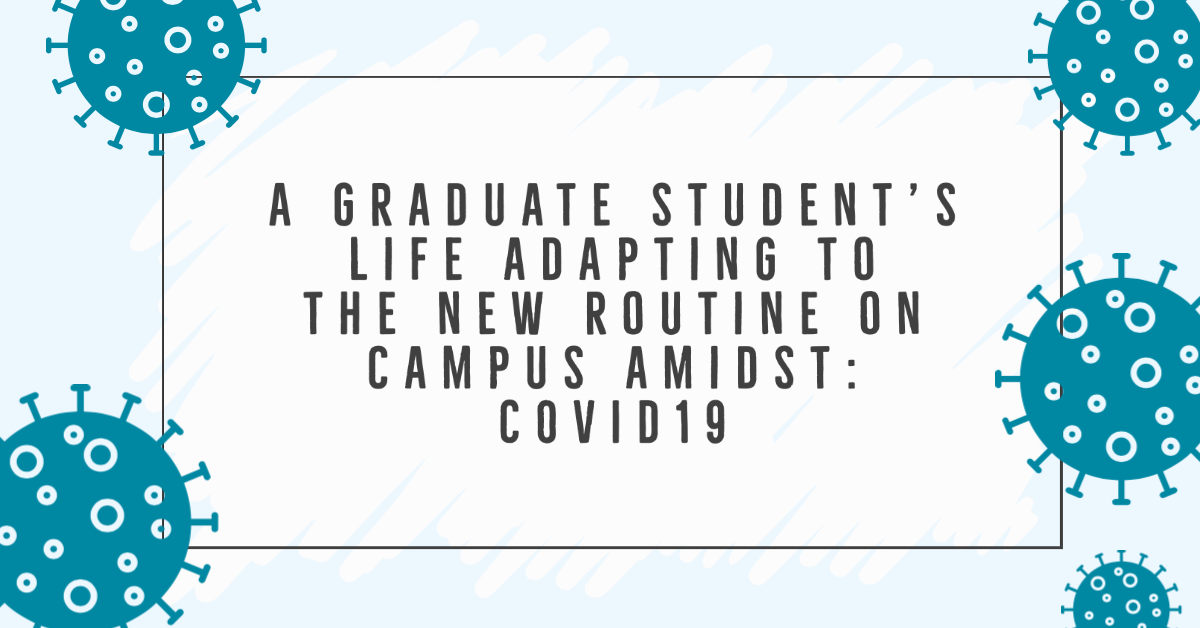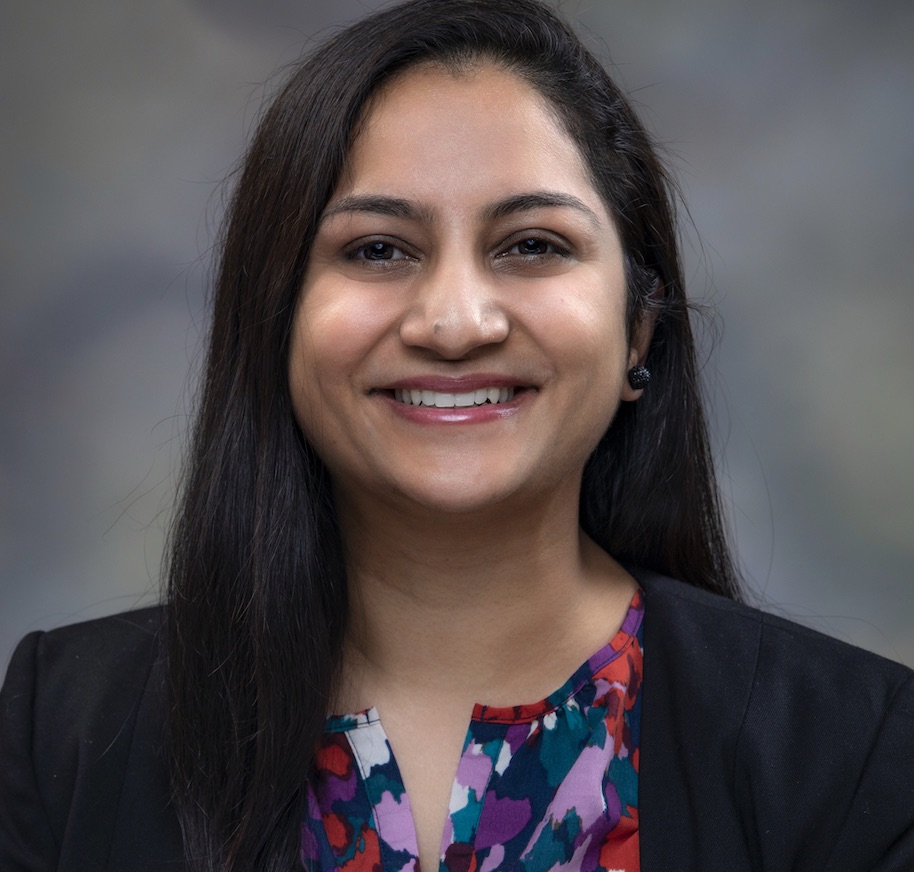A graduate student’s life adapting to the new routine on campus amidst: COVID19
 Returning to the campus after the brief shutdown, has been different. I won’t say it has been scary or awkward but different and intimidating to some extent. The entire team of UT Health San Antonio has been working very hard to make new policies, implementing safety and hygienic guidelines, new work etiquettes to ease in the transition. As a graduate student, it was difficult to grasp this new reality in the beginning and I wanted to share my thoughts on how I have noticed and adapted to some of these changes in my grad school life during this COVID-19 pandemic.
Returning to the campus after the brief shutdown, has been different. I won’t say it has been scary or awkward but different and intimidating to some extent. The entire team of UT Health San Antonio has been working very hard to make new policies, implementing safety and hygienic guidelines, new work etiquettes to ease in the transition. As a graduate student, it was difficult to grasp this new reality in the beginning and I wanted to share my thoughts on how I have noticed and adapted to some of these changes in my grad school life during this COVID-19 pandemic.

- Working in shifts: Many labs including ours have been work in shifts to minimize the total number of people in the lab and make social distancing practical. This means not seeing your colleagues everyday and no more visiting Starbucks with them!
- Screening stations: Everyone who enters the campus must be screened for daily temperature and answer a brief questionnaire at entry points across the campus. I think this is a great initiative and hats off the tireless work of the volunteers at the screening station. To further ensure safety and convenience, UT Health San Antonio has installed hands-free temperature self-screening stations recently.
- Masks: As a safety guideline, I am very thankful that it is mandatory to wear mask when on campus including in the parking lot. Several studies have shown that wearing masks are effective in preventing spread of COVID-19 coronavirus. There have been several articles about choosing the right kind of masks.
It was strange in the beginning to see everyone around in the masks, I would begin to smile at people and then remember that they can’t see me smile. Once, someone called my name and waved at me, and took me a while to recognize them!!! While leaving home these days, I make sure that along with my badge and car keys, I have mask with me (keep extras in the car).

Masks have become a new fashion statement. Recently, I have seen so many trendy masks around the campus. ‘I love the print/ design on your mask’, is a sentence I never thought I would hear/say until three months ago.

- Increased Anxiety: When I returned to the campus in the beginning, I was jittery all the time, looking over my shoulder, making sure I am keeping the 6 ft distance. It is easy to tell yourself; I can maintain 6 ft distance from others, how hard that can be? Then you find yourself with other people in small spaces like elevators or narrow hallways where the total area is less than 6 ft and don’t know what to do, should I turn around/get away from here and how do I do that without coming off rude!!!
This situation is like studying for the exam where we tell ourselves ‘Oh, that’s easy, I will remember that!’ and on the exam day when we see a trick question, our response is ‘Wait! I wasn’t expecting that!!What kind of question is this?’.
So, what helps in situations like these? its simple: wearing a MASK!! Trust me I am an Immunologist and a Microbiologist, a mask helps!
- Disinfecting surfaces and washing your hands: I don’t remember if I ever washed my hands these many times in a day in my life. The importance of keeping work area and hands clean cannot be stressed enough! Keeping a sanitizer on my bench and car has been helpful.
- Virtual classes, meetings and defenses: Thanks to the technology, attending all classes and meetings are still possible virtually! I am sure we all have at least one funny story to share that happened during a virtual meeting/class. Although, it isn’t same as walking into the classroom or talking to an individual, it still gets the job done.
- Eating lunches alone: Taking a lunch break is so different these days. Since most of the lunch break rooms either restricts the total number of people or are closed, eating alone out in the open space sometimes is the only option. It has been okay till now, but I don’t think it will be possible to eat out in the open areas once Texas summer kicks in and we have 100F temperature!
- More parking space: Parking has been a breeze most of the times in the past few months and I am not complaining about this.
- After work: Prior to the pandemic, when I would come home, if my toddler would run into my arms, and hug me tight, that would make smile. These days, hugs must wait until I have sorted out all the work-related items and have showered.
- Being grateful: Although these times have not been easy, it has made me realize that I have the support of my loved ones, friends and colleagues and we all are in this together and how it has helped me to get through these new changes, and still work efficiently in a new environment.
These above changes have become our reality these days. This reality may sound overwhelming, but this also shows that we have adjusted and adapted in such a short span of time and that’s astonishing. Great minds from all over the world are working together in fighting this pandemic. It is normal to feel frustrated and helpless in the current situation, but every day brings a new hope and it is very important to be kind to oneself and keep reminding ourselves how strong we are and most importantly we all are in this together.
About the Author
 Manpreet Semwal is a student in the Molecular Immunology & Microbiology discipline of the Integrated Biomedical Sciences program. Her research focuses on addressing the physiological functions of Reactive oxygen species (ROS) in stromal cells in the young, steady state thymus. She is working in Dr. Ann Griffith’s lab that focuses on identifying the causes and consequences of age-associated thymic stromal dysfunction. Their ultimate goal is to develop novel approaches to extend the health span during aging. Read more about her work in the article, “Manpreet Semwal: Having a Ph.D. Will Help Me Train Future Scientists.”
Manpreet Semwal is a student in the Molecular Immunology & Microbiology discipline of the Integrated Biomedical Sciences program. Her research focuses on addressing the physiological functions of Reactive oxygen species (ROS) in stromal cells in the young, steady state thymus. She is working in Dr. Ann Griffith’s lab that focuses on identifying the causes and consequences of age-associated thymic stromal dysfunction. Their ultimate goal is to develop novel approaches to extend the health span during aging. Read more about her work in the article, “Manpreet Semwal: Having a Ph.D. Will Help Me Train Future Scientists.”
The “Beyond The Bench” series features articles written by students and postdoctoral fellows at the Graduate School of Biomedical Sciences at The University of Texas Health Science Center San Antonio.
